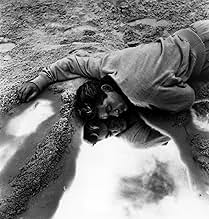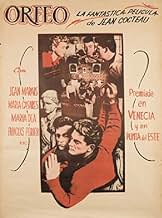CALIFICACIÓN DE IMDb
7.8/10
14 k
TU CALIFICACIÓN
Un poeta enamorado de la Muerte sigue a su triste esposa hacia en inframundo.Un poeta enamorado de la Muerte sigue a su triste esposa hacia en inframundo.Un poeta enamorado de la Muerte sigue a su triste esposa hacia en inframundo.
- Dirección
- Guionista
- Elenco
- Nominada a1 premio BAFTA
- 2 nominaciones en total
André Carnège
- Judge
- (as Maurice Carnège)
Paul Amiot
- Judge
- (sin créditos)
Philippe Bordier
- Young Man at Café des Poètes
- (sin créditos)
Claude Borelli
- Une bacchante
- (sin créditos)
Jean-Louis Brau
- Un jeune homme à la terrasse du flore
- (sin créditos)
Jean Cocteau
- Narrator
- (voz)
- (sin créditos)
- Dirección
- Guionista
- Todo el elenco y el equipo
- Producción, taquilla y más en IMDbPro
Argumento
¿Sabías que…?
- TriviaThe opening scenes set in the Cafe des Poetes were originally set to be filmed with regular extras. However, Cocteau found them to be too self-conscious and artificial so they were all dismissed. Instead, real bohemians from Paris' real café culture were drafted in. These proved to be so natural and relaxed with the café setting, they actually stayed on for two extra days after filming had finished, just hanging out in the cafés that the film crew had been using.
- ErroresWhen Orphée is shot, the gun falls near his right foot. However when Heurtebise picks up the gun; the orientation changes and it is now near his right hand.
- Citas
Heurtebise: I am letting you into the secret of all secrets, mirrors are gates through which death comes and goes. Moreover if you see your whole life in a mirror you will see death at work as you see bees behind the glass in a hive.
- ConexionesEdited into Histoire(s) du cinéma: Une histoire seule (1989)
- Bandas sonorasDance of the Blessed Souls -- from Orphée et Eurydice
Written by Christoph Willibald Gluck
Opinión destacada
From its explosive opening where a brawl occurs at a café for poets that's "the nerve-centre of the world" to traveling through the afterlife to the very end, Orphée's mania never stops. It's an incredibly gripping and bizarre film which immediately evolves into a bad dream. It's grandest aspect is the visual treat that visionary director Jean Cocteau offers. The camera is fluid and active, whipping between characters and sets, exploring high and low angles. Though the highlight is the special effects, especially for its time even if clearly channeling Méliès, with seamless reversed shots, projections, wires and point of view shots involving mirrors. The narrative flows fluently to give a rich and inventive story, with elements of innovative humour, with double meanings and exaggerations, and tragedy redeemed. With its ambiguity between reality, dream or fantasy world, it could even be argued that there is no reality and it begins right in the fantasy, though the expert use of foreshadowing renders that aspect irrelevant in cinema.
Despite it having a very compacted story, there's not enough emotional or thought-provoking ideas there for me to understand why it's considered a masterpiece, especially due to its consistent tension, rather than an ideal fluctuating tone. The characters, besides the surprising supporting character Heurtebise with a subtle performance from François Périer, there is little chemistry between the actors, who for the majority of the time give melodramatic performances solely for the camera. As it's a story trying to be about love, this only comes across as a sidenote to the spectacle. There is, however, the fascinating idea of how an artist can be so enamoured with inspiration that they neglect their real life and purpose of why they're creating their art. It also does not show any of the deaths, the films other main theme, which dramatically decreases their potential power. There is an incidental scene where the Inspector is talking to people in his office in which it has a brief flashback while a man is talking of what he's talking about - a technique Hiroshima Mon Amour later innovated. With the dazzling and inventive direction, Orphée is a great film, but too often doesn't take itself seriously enough.
8/10
Despite it having a very compacted story, there's not enough emotional or thought-provoking ideas there for me to understand why it's considered a masterpiece, especially due to its consistent tension, rather than an ideal fluctuating tone. The characters, besides the surprising supporting character Heurtebise with a subtle performance from François Périer, there is little chemistry between the actors, who for the majority of the time give melodramatic performances solely for the camera. As it's a story trying to be about love, this only comes across as a sidenote to the spectacle. There is, however, the fascinating idea of how an artist can be so enamoured with inspiration that they neglect their real life and purpose of why they're creating their art. It also does not show any of the deaths, the films other main theme, which dramatically decreases their potential power. There is an incidental scene where the Inspector is talking to people in his office in which it has a brief flashback while a man is talking of what he's talking about - a technique Hiroshima Mon Amour later innovated. With the dazzling and inventive direction, Orphée is a great film, but too often doesn't take itself seriously enough.
8/10
- Sergeant_Tibbs
- 9 jul 2013
- Enlace permanente
Selecciones populares
Inicia sesión para calificar y agrega a la lista de videos para obtener recomendaciones personalizadas
- How long is Orpheus?Con tecnología de Alexa
Detalles
- Tiempo de ejecución1 hora 52 minutos
- Color
- Relación de aspecto
- 1.37 : 1
Contribuir a esta página
Sugiere una edición o agrega el contenido que falta

Principales brechas de datos
By what name was Orfeo (1950) officially released in India in English?
Responda



















